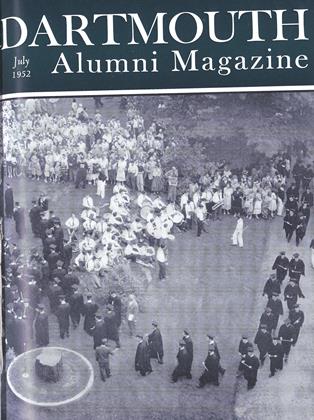edited by Arthur H. Vandenberg Jr. '28. Houghton Mifflin Co., Boston, 1-952; 599 pp.; $5.00.
This book is fascinating reading for those interested in the careers of great men and in postwar U.S. foreign policies. It consists of excerpts from diaries, letters, and speeches of the late Senator Vandenberg, with helpful background information provided by editors Arthur H. Vandenberg Jr. and Joe A. Morris.
Senator Vandenberg's continued growth as a statesman took place under circumstances of increasing personal responsibility and of changing national and world conditions. He was greatest in the last ten years of his life, a period that coincided with the adjustment of traditional American nationalism and unilateral foreign policies to the realities and necessities of the post-war period.
Vandenberg's influence was instrumental in getting Republican leaders to accept, in the 1943 "Mackinac charter," the idea that patriotism and cooperative foreign policies were not incompatible. He was devoted to the "indispensable doctrine that Americans can be faithful to the primary institutions and interests of our own United States and still be equally loyal to the essential post-war international cooperations which are required to end military aggression for keeps and to create a post-war world in which organized justice shall protect freedom."
His great talents in negotiation were used to establish this principle as a vital force in international affairs. The significance of his accomplishments in the formation of the United Nations charter, in the U. S. Senate, and in Republican party councils is incalculable.
This principle also affected his judgment of other national leaders. In this presidential election year, it is worth noting that Vandenberg had marked Eisenhower as a Republican candidate whom he could support with enthusiasm. The General, he thought, shared his belief that the security of the United States depended upon national unity, and international cooperation, and had, moreover, qualities of leadership essential to both.
Although Vandenberg seems to have been in accord with most of Senator Taft's views on domestic matters, the Papers suggest that he doubted his colleague's capacities as a leader of foreign affairs.
One of the entries in the diary (p. 488) records a "delightful" trip to Dartmouth in June 1949, when the Senator received an honorary LL.D. and delivered a memorable address.
 View Full Issue
View Full Issue
More From This Issue
-
 Article
ArticleThe Fifty-Year Address
July 1952 By E. BRADLEE WATSON '02 -
 Article
ArticleThe 1952 Commencement
July 1952 -
 Article
ArticleBaccalaureate Address
July 1952 By SIR OLIVER S. FRANKS -
 Article
ArticleDartmouth Awards Mine Honorary Degrees
July 1952 -
 Class Notes
Class NotesThe Big 25th for 1927
July 1952 By DOANE ARNOLD '27 -
 Class Notes
Class NotesA Glowing 190 7 Report
July 1952 By H. RICHARDSON LANE '07
Donald H. Morrison
-
 Article
ArticleGeneral Education
October 1951 By Donald H. Morrison -
 Books
BooksTHE STATES AND THE NATION.
January 1954 By DONALD H. MORRISON -
 Books
BooksSOLDIERS AND SCHOLARS: Military Education and National Policy
March 1957 By DONALD H. MORRISON -
 Article
ArticleFrom Dependence Upon Teaching To Independence in Learning
April 1957 By DONALD H. MORRISON
Books
-
 Books
BooksShelflife
Mar/Apr 2006 -
 Books
BooksALL THE BEST IN CUBA
February 1947 By C. F. Callahan '47 -
 Books
BooksDartmouth
November, 1922 By C.C.S. -
 Books
BooksSOME SILENT PLACES STILL.
FEBRUARY 1970 By ELLIS BRIGGS '21 -
 Books
BooksCREATIVE PLAY DIRECTION.
November 1974 By JOHN FINCH -
 Books
BooksAMERICAN WRITERS-A
December 1937 By John Neal.


